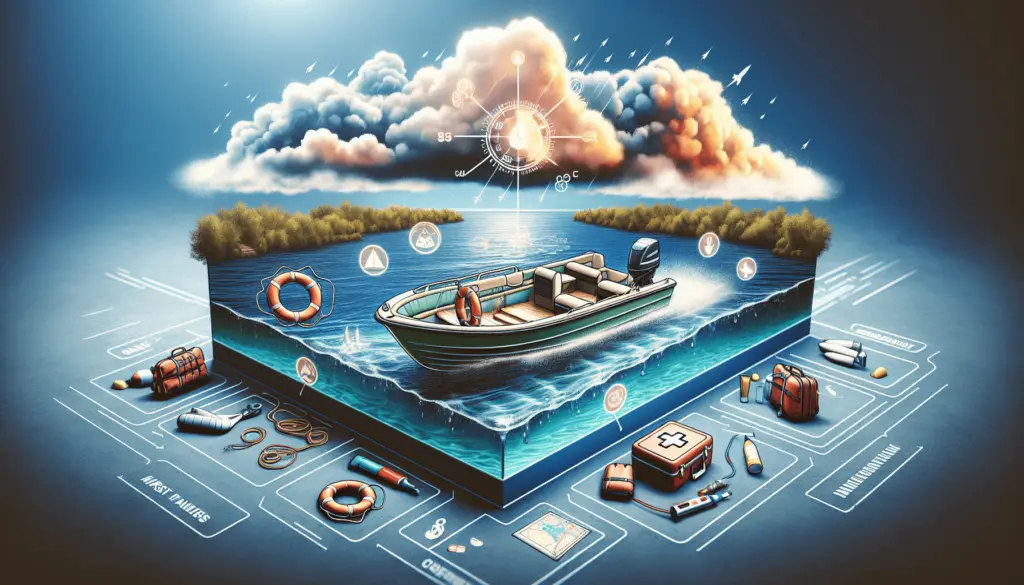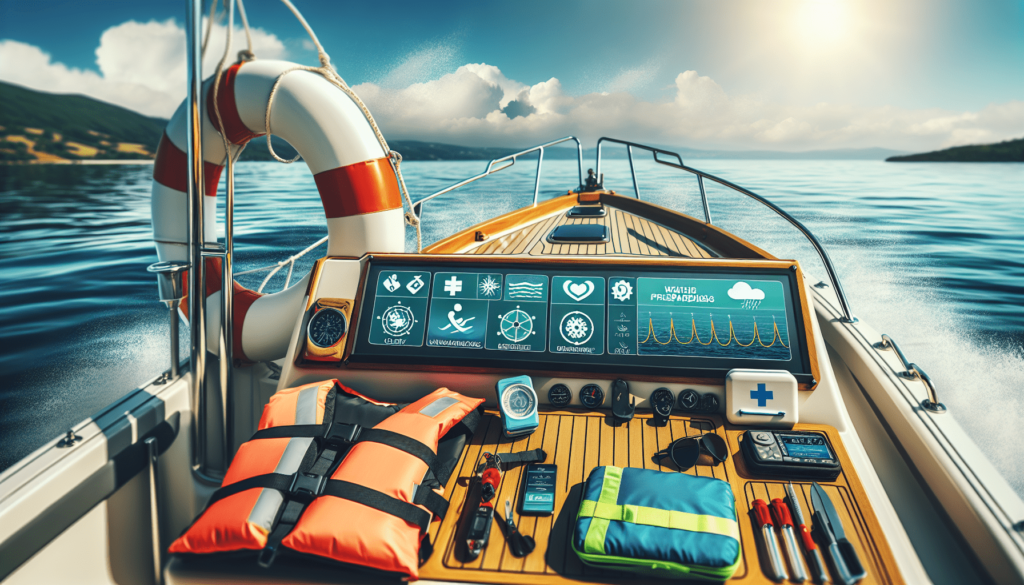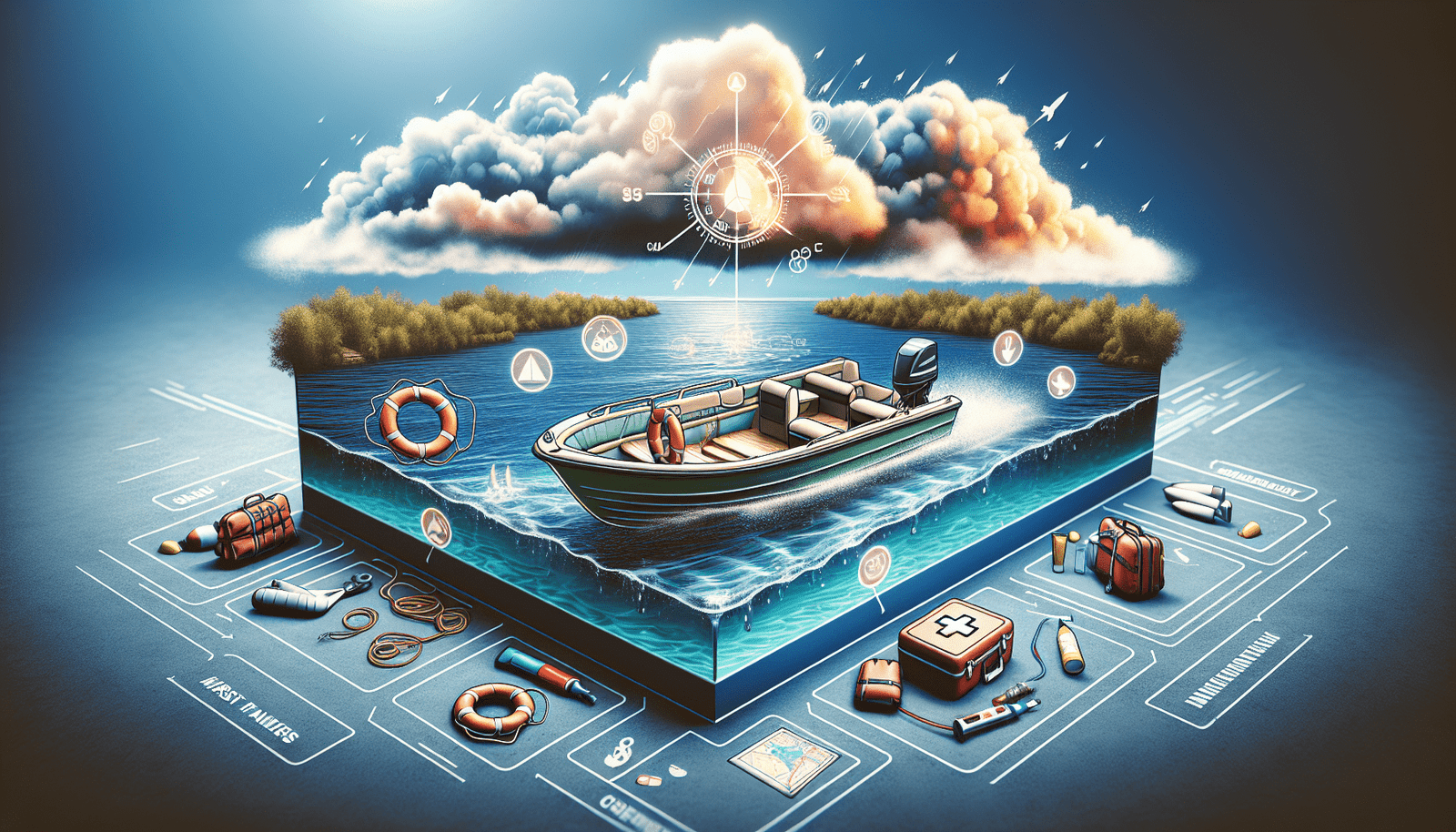As you feel the gentle rock beneath your feet and the salty sea air fills your lungs, there’s no mistaking the exhilaration and adventure that accompanies a day out on the water. Yet, in the swirl of excitement, many often overlook or underestimate the potential perils of boating. In this article, “Common Safety Mistakes to Avoid While Boating,” you’ll navigate through a seafarer’s most common oversights and discover crucial steps to ensure your voyage remains a thrilling, yet safe experience. From poor preparation to casual attitudes towards safety gear, you will learn about the common mistakes that can lead to dangerous situations, and more importantly, how to prevent them. Let the thrill of the open water inspire, but not blind you to the necessary measures of safety; as the line between a day of unadulterated fun and disaster can be a thin one indeed.
Ignoring Weather Forecasts
When you embark on a boating journey, the thrill of the open water and the promise of adventure can sometimes cloud your judgment. One such instance is when you fail to check the weather conditions. Ignorance, in this case, is certainly not bliss. The sea can be a deceptive beast, appearing calm one moment and transforming into a tempest the next.
Failure to Check Weather Conditions
Foraying into the deep blue without even so much as glancing at a weather forecast might seem like an adrenaline-fueled adventure to some, but it can quickly turn into a nightmare. Irrespective of the size or model of your boat, unpredictable weather conditions pose a considerable threat.
Setting Out Despite Poor Weather Alert
With the advent of technology, weather alerts are accessible and provide real-time information. To choose to ignore them despite their warnings, and set out on a sea or lake is nothing but an act of recklessness. Remember, Mother Nature is a formidable adversary that no vessel, no matter how sturdy, can withstand.
Ignoring Sudden Changes in Weather While At Sea
Transitions in weather conditions at sea can be sudden and dangerous. If you are already at sea when the weather changes, turning back or improving safety measures onboard can save lives. Ignoring these changes can result in disastrous consequences.
Skipping Safety Checks
A cardinal rule of boating is conducting a comprehensive inspection of your boat and equipment before setting sail. It is a step that lays the foundation for a safe trip, lending you confidence while ensuring you proceed with caution.
Not Inspecting Boat and Equipment Before Departure
Beginning your journey without a thorough check of your boat and its equipment is akin to walking blindfolded into a room filled with obstacles. Check your engine, your navigational instruments, radios, and life-saving apparatus. Each unchecked item increases your risk factor.
Overlooking Potential Mechanical Problems
Human nature tends to lead us to conveniently ignore anything that doesn’t seem like an immediate problem. Well, when you’re in the heart of the sea with a failed motor or unresponsive navigation system, that minor glitch becomes a monumental issue. Address any mechanical problems before you set sail.
Failing to Replenish Safety Equipment
Just as you would not want your pantry to run out of supplies, you should not allow your safety equipment to diminish aboard your vessel. Regularly check and refill these vital resources. Imagine you are stranded and in need of flares to signal for help, and you find that they have expired. You can prevent such scenarios by replenishing safety equipment.

Overloading the Boat
While preparing for a boating journey, it’s easy to overpack or invite numerous guests without considering the capacity of your boat. This may lead to disastrous consequences.
Exceeding the Boat’s Capacity
Each boat comes with a listed capacity that specifies the weight it can safely carry. Exceeding this limit can challenge the boat’s stability and may lead to capsizing.
Poor Distribution of Weight
It’s not just about how much weight, but also where it is placed. Improper weight distribution can make the vessel unstable. A balanced boat is a safe boat, and you should always try and maintain even weight distribution on board.
Carrying Too Much Gear
We all love creature comforts. But filling your boat with unnecessary gear will reduce the space to move, also adding weight. Remember, while at sea, simplicity is bliss and safety.
Not Wearing Life Jackets
Life jackets are your lifeline on choppy waters, and ignoring their importance is equivalent to jeopardizing your life.
Ignoring the Importance of Life Vests
No matter how experienced a swimmer you are, rough water can turn against you in an instant. Life vests are designed to keep you afloat even in harsh conditions, and ignoring their importance can have deadly consequences.
Not Having Adequate Life Jackets for Everyone Onboard
Every person on board needs to have a life vest. Period. Letting even one person go without a life vest significantly increases the risk factor and leaves their life hanging in the balance.
Not Wearing Life Jackets Despite Rough Waters
Rough waters demand increased vigilance and stringent safety precautions. Not wearing a life jacket when the sea decides to show its might can lead to dire consequences. Stay strapped, stay safe.

Operating the Boat Under Influence
Steering a vessel requires presence of mind and swift reflexes. If alcohol or drugs impair these, it can lead to mishaps.
Driving the Boat After Consuming Alcohol or Drugs
Operating a boat under the influence is not just illegal; it’s highly dangerous. It can impair your judgment, blurring your perception of danger significantly.
Not Knowing the Impact of Impairment on Navigation
The sea is a highly unpredictable body; one puff of wind can set your boat veering off course. To navigate safely, you need a clear head. Impaired judgment can cause you to misread the tides or misjudge distances, leading to potential collisions.
Failure to Assign a Sober Skipper
If you plan to enjoy a drink aboard, ensure there is a designated skipper who remains sober. This person can ensure the boat operates safely while others have a good time.
Lack of Communication Plan
Your plans for a fun-filled day out in the sea can quickly turn sour if you don’t have a feasible communication plan in place. Devising a communication plan and adhering to it is essential.
Not Informing Someone About the Trip Details
Always ensure someone onshore knows about your plans, including your route and expected time of return. This will be invaluable in raising an alarm and initiating a search and rescue operation if you run into trouble.
Neglecting to Establish Scheduled Check-Ins
Establishing regular check-ins with someone on land can make a world of difference if something goes wrong. This simple act can potentially speed up rescue operations.
Failure to Have a Plan in Case of Emergency
Hope for the best, but prepare for the worst. Understanding the steps to take and the signals to use can be the difference between a dangerous situation and a catastrophic one.
Poor Navigation
Safe navigation is an art that commands respect for the rules and the terrain.
Not Having a Proper Understanding of Navigation Rules
Just like on roads, there are rules on the sea that need to be followed. These include knowing who has the right of way, how to avoid collisions, and understanding navigation aids.
Ignoring Marked Boating Lanes and Routes
Marked lanes and routes are there for a reason. Deviating from them can expose you to dangers such as uncharted waters, hidden rocks, and strong currents.
Failure to Carry Navigation Aids and Tools
Navigation aids such as charts, compasses, and GPS are crucial to help you find your way, especially in unfamiliar territories. These tools are your guide; they help you understand where you are and how to safely reach your destination.
Not Being Aware of Surroundings
While enjoying the beauty of the sea, make sure you also keep an eye on the activity going on around you.
Failure to Keep an Eye for Other Vessels
The sea can be a busy place, with boats of all sizes sharing the space. All it takes is one moment of distraction to cause a collision with another boat.
Ignoring Potential Hazards Like Rocks or Shallow Waters
Just because the sea appears calm, doesn’t mean it is safe. Hazards such as rocks, reefs, or a sudden dip in the depth can pose significant threats. Keep a keen eye to avoid these potential dangers.
Not Being Watchful of Swimmers or Divers
The sea is a playground for swimmers and divers too. It’s essential to stay vigilant and avoid causing an accident.
Quick Action During Emergency
In an emergency, your reaction can make all the difference between a rescue and a tragedy.
Freaking Out During Emergency Situations
Panic can cloud your judgment. Stay calm, think rationally, and get help on its way at the earliest.
Incorrect Usage of Safety Equipment in Emergencies
Understanding the correct use of safety equipment saves precious time during emergencies. Familiarize yourself with the equipment, so you won’t fumble when the need arises.
Unable to Call for Help or Signal Distress
Always have the knowledge and the means to send out a distress signal or call for help. You and your crew’s safety might completely depend on how quickly help is alerted.
Neglecting Boat Maintenance
Just like a car, a boat requires regular maintenance to stay in optimum condition.
Failure to Perform Regular Servicing
Regular servicing not only ensures that your vessel stays in great condition but also saves you from future expenditures for repairs.
Ignoring Minor Repair Needs
What might seem like a small repair can lead to significant issues if left unattended. Maintain your boat diligently to keep it seaworthy.
Not Changing Parts on Time
Changing worn parts on time is crucial to ensure the smooth functioning of your boat. Do not ignore the signs, as a single broken part can put your entire outing at risk.
To conclude, boating is an exhilarating and rewarding experience. However, safety is the keystone to enjoyment. By avoiding these common mistakes, you can ensure that your trip is a memorable one for all the right reasons. After all, it’s not just about getting to the destination; it’s also about how safely you get there.

